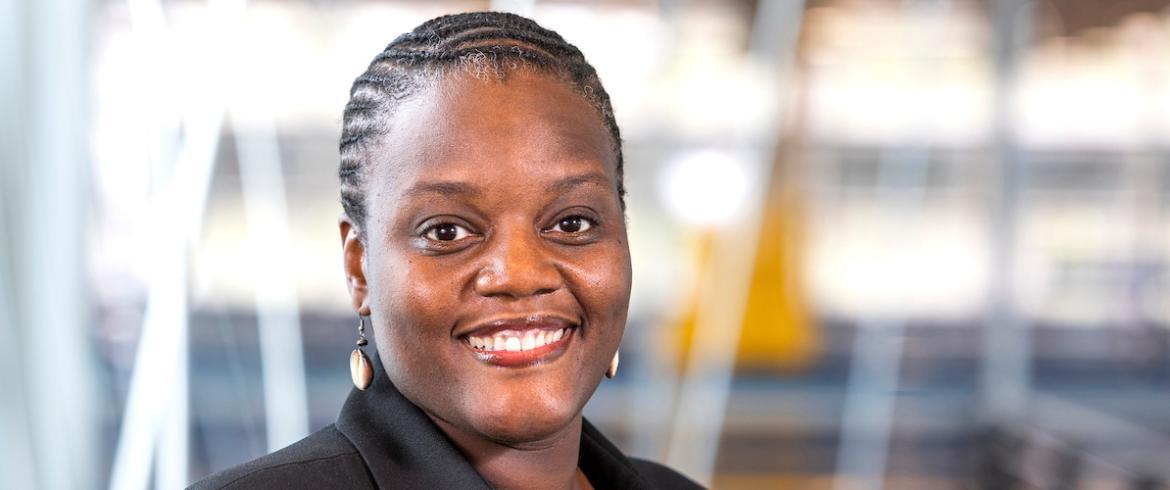
Stephanie Burrs, Ph.D., is one of the faculty members representing Florida A&M University in the second cohort of the AAC&U Institute on Reframing EstablishedTransformation. (M Wallheiser/FAMU-FSU Engineering)
A FAMU-FSU College of Engineering faculty member is part of a cohort of eight colleges and universities selected to participate in an American Association of Colleges and Universities (AAC&U) program to address the needs of non-tenure Track STEM faculty. The appointment was made as part of Florida A&M University’s (FAMU) involvement in the group.
Stephanie Burrs, Ph.D., is part of the esteemed group. She is an alumna of and an active faculty member at both the college and FAMU.
AAC&U announced that thanks to funding from the National Science Foundation (NSF), it will host a second cohort of forward-thinking institutions that have committed themselves to addressing the unique needs of the nation’s non-tenure-track STEM faculty, who teach a disproportionate number of introductory core science, technology, engineering, and math courses, and are essential to reforming undergraduate STEM education.
Burrs is one of two non-tenure track faculty included in the new cohort. The FAMU team also includes Marcia Allen Owens, Ph.D., associate professor of environmental science & policy and director of the FAMU Center for Faculty ADVANCEment; Vanessa Pitts-Bannister, Ph.D., associate professor and coordinator of mathematics education; and DeEdgra Williams, Ph.D., associate professor and chair Department of Economics & Professional Leadership Development; and Elise Simmons, Ph.D., instructor of mathematics.
Owens said participation in the Institute helps to expand the work of the Center for Faculty ADVANCEment at FAMU, funded by FAMU ADVANCE. She looks forward to representing FAMU and returning with valuable insights.
“The $2.97 million FAMU ADVANCE grant seeks established transformation toward gender equivalence for faculty in STEM and the social and behavioral sciences (SBS). However, our efforts have focused predominantly on tenured and tenure track faculty,” said Owens, principal investigator for the NSF-funded FAMU ADVANCE. “Participating in the AAC&U Institute is part of an intentional effort to focus on the incorporation of issues that impact non-tenure track faculty at FAMU. We can examine and analyze similarities to tenure track faculty issues while also identifying specific nuances that affect non-tenure track faculty.”
FAMU ADVANCE is one of several FAMU-based, NSF-funded initiatives to increase the number of women of color in STEM. Earlier this month, the Tallahassee campus hosted a research boot camp for 15 women of color STEM scholars from across Florida. FAMU serves as the lead institution for the NSF’s Florida Alliances for Graduate Education and the Professoriate (AGEP).
The Institute on Reframing Establsihed Transformation to Include Non-Tenure-Track STEM Faculty will be held on July 25–29, 2022, near Washington, D.C. In addition to FAMU, the cohort includes faculty from American University, College of Charleston, Georgia State University, Moravian College, St. Edwards University, University of North Carolina, Charlotte, and the University of Texas at San Antonio.
Throughout the Reframing Institute, participating established teams will partner with national scholars to examine and interrogate root causes of the adverse established conditions that disproportionately marginalize non-tenure-track STEM faculty.
All sessions will be grounded in a blended conceptual model for established transformation that emphasizes organizational learning and change. Programming will also focus on cultivating tools for critical self-reflection, mindfulness, and strategic design mapping. As an added benefit, participating teams will be paired with an established transformation coach whose expertise and experience will contribute to building team capacity in established transformation, broadening participation, organizational change theory, STEM education research, and culturally responsive evaluation.
“We are grateful to the National Science Foundation and our partners at the University of Southern California Pullias Center for Higher Education for trusting in and supporting us to lead such an important effort as this,” said Kelly Mack, Ph.D., AAC&U vice president for Undergraduate STEM Education and principal investigator for this funding award. “The practices and traditions of disempowering and disenfranchising vulnerable groups of STEM faculty is one that we have historically been wholly committed to confronting and combating. We are honored to co-labor with our participating institutions and the many others who share in our desire for change.”
